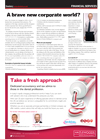Article taken from the August 2014 edition of the Dentistry magazine. 
Since The Dentists Act changed in 2006, a lot of dentists have incorporated their practices. The expansion of the large corporates and the emergence of mini-corporates have driven goodwill prices up over the last few years, despite the economic recession.
As company structures become more prevalent, so do the factors that go with this. Buying a limited company is far more complex than buying the trade and assets of a sole proprietor or partnership, something dentists do not necessarily realise.
If you buy an asset, e.g. equipment, you would normally check it’s working properly, perhaps check maintenance records and pay a fair market value for it, so this is fairly straightforward. If you are buying a car you might ask a mechanic to check it over. If you are buying shares in a company which owns a dental practice, you are taking on the history of that company. Any problems after the purchase will become your responsibility as the new owner, so asking an expert to check the company out makes a lot of sense!
Examples of potential issues include:
- Incorrect claim for expenses in the corporation tax computations
- Benefits in kind not being reported
- Use of complex tax planning arrangements
- Problems with the treatment of pension contributions
- Patient, staff or associate issues resulting in a claim against the company
It is therefore essential to carry out due diligence checks on the company’s accounts, tax and business affairs to ensure that any problems are addressed before you buy, or are factored in to the purchase price. Multi-million pound deals have fallen apart because of issues lurking in a company’s past!
What are you buying?
It is important to understand exactly what you are buying when you acquire a limited company. One issue is that the value of the goodwill and fixed assets is not the value of the shares. You are also taking on all of the assets and liabilities of the company, which should be factored into the share valuation. This includes the company’s cash at the bank, something sellers may not appreciate!
Questions to ask include; does the company have a lot of debt? Is there a director’s loan account?
If so, how will this be repaid? What effect will this have on the purchase price and most importantly, what are the Net Current Assets?
Acquiring a limited company has far more pitfalls than a straightforward asset purchase therefore,
more than ever, it is important to contact your professional advisers to ensure you’re
buying what you think you’re buying.
Structure
It is also important to take professional advice in respect of how you structure the transaction. Depending on the nature of the purchase, it might be sensible to set up your own new limited company, which would borrow the funds to buy the existing company. This could have significant cashflow and tax advantages.
Is it worth it?
It’s clear that there are many things to consider. Each practice is different and a company structure adds a degree of complexity. However, the potential savings can be significant and with the right professional advice you can enter this brave new corporate world.